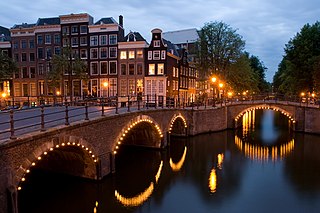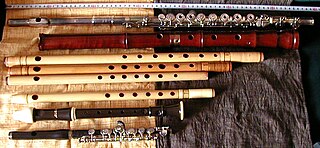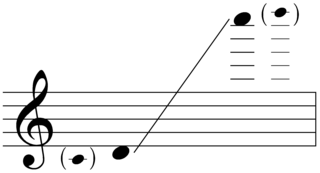A string orchestra is an orchestra consisting solely of a string section made up of the bowed strings used in Western Classical music. The instruments of such an orchestra are most often the following: the violin, which is divided into first and second violin players, the viola, the cello, and usually, but not always, the double bass.
John Arthur Casken is an English composer, born in Barnsley, Yorkshire, England. Casken read music at the University of Birmingham, studying composition and contemporary music with John Joubert and Peter Dickinson. He then went on to study in Poland with Andrzej Dobrowolski on a Polish government scholarship at the Academy of Music in Warsaw, from 1971 to 1972. During this time he began to have regular consultations with Witold Lutosławski, with whom he formed a close association and friendship. Casken has since written articles on the music of Lutosławski, including the contribution of the chapter "The Visionary and Dramatic in the music of Lutosławski" to Zbigniew Skowron's Lutosławski Studies. Casken left Poland to return to Birmingham as a lecturer in 1973. After a Fellowship at Huddersfield Polytechnic in 1980, he was appointed as a lecturer at the University of Durham in 1981. He was Professor of Music at the University of Manchester from 1992 to 2008 and maintains strong links with The University of Manchester as Emeritus Professor of Music.
Polish composer Witold Lutosławski's Concerto for Orchestra was written in the years 1950–54, on the initiative of the artistic director of the Warsaw Philharmonic, Witold Rowicki, to whom it is dedicated. It is written in three movements, lasts about 30 minutes, and constitutes the last stage and a crowning achievement of the folkloristic style in Lutosławski's work. That style, inspired by the music of the Kurpie region, went back in him to the pre-1939 years. Having written a series of small folkoristic pieces for various instruments and their combinations, Lutosławski decided to use his experience of stylisation of Polish folklore in a bigger work. However, the Concerto for Orchestra differs from Lutosławski's earlier folkloristic pieces not only in that it is more extended, but also that what is retained from folklore is only melodic themes. The composer moulds them into a different reality, lending them new harmony, adding atonal counterpoints, turning them into neo-baroque forms.
Twenty Polish Christmas Carols is a collection of Polish carols arranged for soprano and piano in 1946 by Polish composer Witold Lutosławski (1913–1994) and then orchestrated by him for soprano, female choir and orchestra in 1984–89. The music and lyrics were taken mostly from 19th-century printed sources.
The International Rostrum of Composers (IRC) is an annual forum organized by the International Music Council that offers broadcasting representatives the opportunity to exchange and publicize pieces of contemporary classical music. It is funded by contributions from participating national radio networks.

Witold Lutosławski wrote his Symphony No. 3 in 1973–1983. The Chicago Symphony Orchestra, conducted by Georg Solti, gave the world premiere on 29 September 1983. The work is dedicated to Solti and the Chicago Symphony Orchestra. It was awarded the Nagroda Solidarności in 1984 and selected for the first Grawemeyer Award for Music Composition in 1985.
The Sacrifice is an opera in three acts composed by James MacMillan with a libretto by the poet Michael Symmons Roberts based on the Branwen story of the Welsh mythology collection, the Mabinogion. The world premiere took place on 22 September 2007 at the Donald Gordon Theatre of the Wales Millennium Centre, Cardiff. The production was staged by Welsh National Opera, directed by Katie Mitchell and conducted by the composer.

Krzysztof Meyer is a Polish composer, pianist and music scholar, formerly Dean of the Department of Music Theory (1972–1975) at the State College of Music, and president of the Union of Polish Composers (1985–1989). Meyer served as professor of composition at the Hochschule für Musik in Cologne from 1987 to 2008, prior to his retirement.
Paul Eugene Glass is a Swiss-American composer.
Zygmunt Krauze is a Polish composer of contemporary classical music, educator and pianist.
Polish composer Witold Lutosławski wrote his Symphony No. 4 in 1988–92, completing it on 22 August 1992.
The Symphony No. 2 by the Polish composer Witold Lutosławski is an orchestral composition in two movements written between 1965 and 1967. The work exhibits Lutosławski's technique of "limited aleatoricism", where the individual instrumental parts are notated exactly, but their precise co-ordination is organised using controlled elements of chance.
L'arbre des songes is a violin concerto written by Henri Dutilleux between 1983 and 1985. It is dedicated to Isaac Stern.
The Concerto for Cello and Orchestra is a cello concerto by the Polish composer Witold Lutosławski. The work was commissioned by the Royal Philharmonic Society with support from the Calouste Gulbenkian Foundation. It received its world premiere at the Royal Festival Hall on October 14, 1970 by the cellist Mstislav Rostropovich and the Bournemouth Symphony Orchestra under the direction of Edward Downes.
The Concerto for Piano and Orchestra is a composition for solo piano and orchestra by the Polish composer Witold Lutosławski. The music was commissioned by the Salzburg Festival. It was first performed at the festival on August 19, 1988 by the pianist Krystian Zimerman and the Austrian Radio Orchestra under the direction of the composer. Lutosławski dedicated the piece to Zimerman.
Aura is a composition for orchestra by the Finnish composer Magnus Lindberg. The work was commissioned by Suntory for the 1994 Suntory International program for music composition. Its world premiere was given on June 11, 1994 in Tokyo by the Tokyo Symphony Orchestra under the direction of Kazufumi Yamashita. The piece is dedicated in memoriam of the Polish composer Witold Lutosławski, who died partway through its composition.
The Symphony No. 8 Autumnal Fragments, Op. 81, is the eighth symphony by the Finnish composer Aulis Sallinen. The work was commissioned by the Royal Concertgebouw Orchestra and was completed in October 2001. Its world premiere was given by the Royal Concertgebouw Orchestra conducted by Paavo Järvi at the Concertgebouw on April 16, 2004.
Chantefleurs et Chantefables is a song cycle for soprano and orchestra set to the poems of Robert Desnos by the Polish composer Witold Lutosławski. The work was composed from 1989 to 1991 and was first performed at The Proms by the soprano Solveig Kringlebotn and the BBC Symphony Orchestra under the direction of the composer on August 8, 1991. The piece is Lutosławski's second composition set to the poetry of Robert Desnos, following 1975's Les Espaces du sommeil.
Les Espaces du sommeil is a song cycle for baritone and orchestra set to a poem of Robert Desnos by the Polish composer Witold Lutosławski. The work was composed in 1975 and was first performed on 12 April 1978 in Berlin by the baritone Dietrich Fischer-Dieskau and the Berlin Philharmonic Orchestra, under the direction of the composer. The piece is Lutosławski's first composition set to the poetry of Robert Desnos, to which the composer returned in 1990's Chantefleurs et Chantefables.








